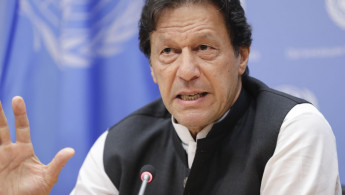Pakistan: Khyber Pakhtunkhwa regional assembly dissolved on ex-PM Khan's orders
The provincial assembly in Pakistan's northwestern Khyber Pakhtunkhwa was dissolved on Wednesday, the second regional government to be brought down by former prime minister Imran Khan in his drive to force early general elections.
Pakistan has been gripped by political turmoil since Khan was ousted in a no-confidence vote last April. He was replaced by a shaky alliance led by Prime Minister Shehbaz Sharif.
The South Asian nation is facing a severe economic downturn, with rocketing inflation, a major shortage of foreign reserves and lagging bailout talks with international lenders.
On Wednesday, Khyber Pakhtunkhwa (KP) governor Haji Ghulam Ali signed a letter dissolving the assembly "with immediate effect" at the request of the provincial chief minister, who is a senior figure in Khan's Pakistan Tehreek-e-Insaf (PTI) party.
Khan's PTI held a majority or was in a coalition government in two of Pakistan's four provincial parliaments.
The move in KP came after the assembly in the most populous province, Punjab, was dissolved late on Saturday by Khan's coalition partners, on his orders.
As per the constitution, fresh elections in both legislatures must be held inside three months.
Historically, federal and provincial elections have always been held simultaneously, but the constitution does allow for separate polling dates.
General elections are due no later than mid-October, and Sharif's government is holding out hope of engineering an economic turnaround to boost its faltering popularity.
"The current government has failed to govern so it's time they realised their responsibility and go for elections to end this political instability," PTI spokesman Fawad Chaudhry told AFP.
"We are ready for elections, and we are ready for a street movement as well," Chaudhry said.
"If they don't call the elections we will have to go for a street movement."
A $7 billion loan agreement with the IMF - about half of which has already been disbursed - has stalled because Pakistan has not fully implemented tough economic measures including slashing subsidies and raising taxes.https://t.co/8r4eKDbo7E
— The New Arab (@The_NewArab) January 13, 2023
Khan still maintains a huge following, and has held a series of anti-government demonstrations to rally support for his cause, a platform based mainly on fighting corruption.
The 70-year-old has repeatedly touted claims he was ousted by a US-led "conspiracy", but has not provided evidence that this was the case.
His ouster from government came after analysts said he fell out of favour with Pakistan's military, which has directly ruled the country for roughly half of its 76-year history, and maintains a strong influence on governance and policy.
In November, Khan was shot and wounded at a party rally, blaming the assassination bid on Sharif and a senior army intelligence officer, without providing evidence of his allegations.





 Follow the Middle East's top stories in English at The New Arab on Google News
Follow the Middle East's top stories in English at The New Arab on Google News
![Israeli forces ordered bombed Gaza's Jabalia, ordering residents to leave [Getty]](/sites/default/files/styles/image_330x185/public/2176418030.jpeg?h=a5f2f23a&itok=_YGZaP1z)

